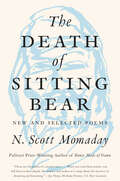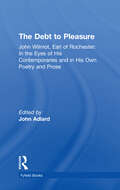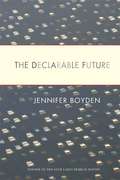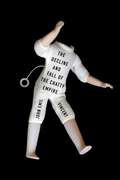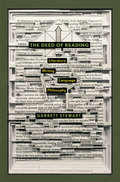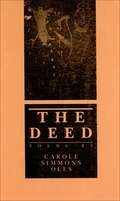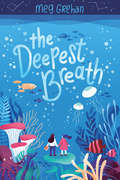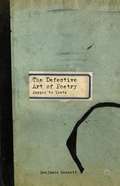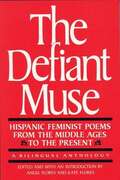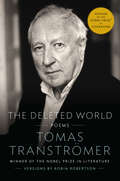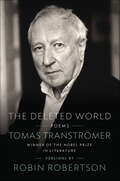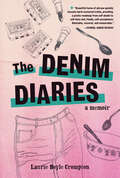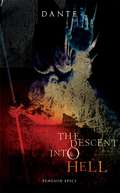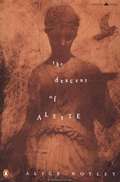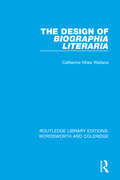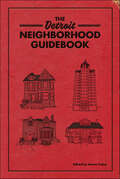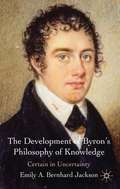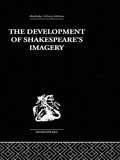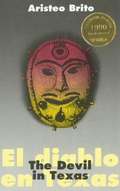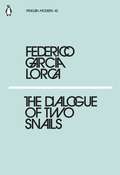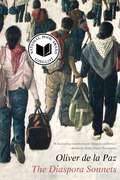- Table View
- List View
The Death Notebooks
by Anne SextonAnne Sexton's work is continually full of surprises. As her poems mature, they show new insights, new visions, sometimes frightening new views into modern existence. She is among our most brilliant and original of modern American poets. This is a collection of her poetry.
The Death of Sitting Bear: New and Selected Poems
by N. Scott MomadayPulitzer Prize winner and celebrated American master N. Scott Momaday returns with a radiant collection of more than 200 new and selected poems rooted in Native American tradition. “The poems in this book reflect my deep respect for and appreciation of words. . . . I believe that poetry is the highest form of verbal expression. Although I have written in other forms, I find that poems are what I want and need most to read and write. They give life to my mind.”One of the most important and unique voices in American letters, distinguished poet, novelist, artist, teacher, and storyteller N. Scott Momaday was born into the Kiowa tribe and grew up on Indian reservations in the Southwest. The customs and traditions that influenced his upbringing—most notably the Native American oral tradition—are the centerpiece of his work.This luminous collection demonstrates Momaday’s mastery and love of language and the matters closest to his heart. To Momaday, words are sacred; language is power. Spanning nearly fifty years, the poems gathered here illuminate the human condition, Momaday’s connection to his Kiowa roots, and his spiritual relationship to the American landscape. The title poem, “The Death of Sitting Bear” is a celebration of heritage and a memorial to the great Kiowa warrior and chief. “I feel his presence close by in my blood and imagination,” Momaday writes, “and I sing him an honor song.” Here, too, are meditations on mortality, love, and loss, as well as reflections on the incomparable and holy landscape of the Southwest.The Death of Sitting Bear evokes the essence of human experience and speaks to us all.
The Debt to Pleasure: John Wilmot, Earl of Rochester: In the Eyes of His Contemporaries and in His Own Poetry and Prose
by John WilmotRochester, incontestably the greatest of the Restoration poets and reprobates, is presented in The Debt to Pleasure both in his own words and in the words of those who loved and loathed him. The book is a mosaic in which the poet's voice and the voice of his age sound with startling, ribald and riotous clarity.
The Declarable Future
by Jennifer BoydenThe poems in this book inhabit a world uneasily familiar and promising, but from the distance of a few possibilities into the future. In this collection of sharp, hallucinatory, and often darkly humorous poems, a lost man wanders among the towns of people who can't remember what they named the children, how to find each other's porches, or whether their buildings are still intact. That's why they need the person with the loupe. Among the poems where doorknobs emit the daily news, stone angels fall from the sky, and the floating world's harvest is whatever swims too close, the person with the loupe steadfastly verifies only what can be measured, while the lost man is witness to the unquantifiable and the limitless. And throughout, precise and observant language leads us expertly into the gorgeous, precarious wilderness ofThe Declarable Future.
The Decline and Fall of the Chatty Empire (Hugh MacLennan Poetry Series)
by John Emil VincentInjury the guide explained / is what / guides explainChatty Cathy, while not the first talking doll, was certainly the most widely known, and the only one elevated to idiom. This unauthorized chronicle of her later career luridly illustrates the perils of reaching such linguistic heights with so very little to say.In The Decline and Fall of the Chatty Empire Jojo, Gypsy May, Marge, Tootles, and Cathy’s entire gang undertake an abject odyssey to celebrity. On their adventure, they have many picnics, listen to NPR inattentively, play charades, and discover sharp things hidden in love’s thick folds. They end where they began, unutterably broken and luminous.Returning to the snarfs and loving exasperation of his first book, Excitement Tax, John Emil Vincent swipes left and right like no one else writing today. Because why would they?
The Deed of Reading: Literature * Writing * Language * Philosophy
by Garrett StewartGarrett Stewart begins The Deed of Reading with a memory of his first hesitant confrontation, as a teenager, with poetic density. In that early verbal challenge he finds one driving force of literature: to make language young again in its surprise, coming alive in each new event of reading. But what exactly happens in the textual encounter to make literary phrasing resonate so deeply with readers?To take the measure of literary writing, The Deed of Reading convenes diverse philosophic commentary on the linguistics of literature, with stress on the complementary work of Stanley Cavell and Giorgio Agamben. Sympathetic to recent ventures in form-attentive analysis but resisting an emphasis on so-called surface reading, Stewart explores not some new formalism but the internal pressures of language in formation, registering the verbal infrastructure of literary prose as well as verse. In this mode of "contextual" reading, the context is language itself. Literary phrasing, tapping the speech act's own generative pulse, emerges as a latent philosophy of language in its own right, whereby human subjects, finding no secure place to situate themselves within language, settle for its taking place in, through, and between them.Stewart watches and hears this dynamics of wording played out in dozens of poems and novels over two centuries of English literary production--from Wordsworth and Shelley to Browning and Hopkins, from Poe and Dickens through George Eliot, Conrad, James, and on to Toni Morrison. The Deed of Reading offers a revisionary contribution to the ethic of verbal attention in the grip of "deep reading."
The Deed: Poems (Poems Ser.)
by Carole Simmons OlesIn Carole Simmons Oles's fourth collection of poetry, small events of everyday life throw open a door to meditations on the absence of a husband, on the separation from children, and on the sustenance gained from friendship and the sorrow its loss. Each poem has an ambitious range, sure in its leap from subject to subject. "In Time, with Holsteins," for example, carries us from close observations on the daily life of cows to facts about Indian rites of penance and purification to worry about a friend's diagnosis of breast cancer.<P><P> Even as the poems take their strength from the personal, they are informed by a global concern, the poet's belief in a network of trust and obligation. <P> In The Deed, Oles's strong female voice is dedicated to the exploration of loss tempered by the particulars of pleasure this world offers. In the generous embrace of its vision, this collection will appeal to a wide readership.
The Deepest Breath
by Meg GrehanAn accessible and beautifully written middle grade novel-in-verse by award-winning Irish author Meg Grehan about Stevie, a young girl reckoning with anxiety about the many things she has yet to understand—including her feelings about her friend Chloe. Perfect for fans of Ivy Aberdeen's Letter to the World, Star Crossed, and George. 11-year-old Stevie is an avid reader and she knows a lot of things about a lot of things. But these are the things she'd like to know the most: 1. The ocean and all the things that live there and why it's so scary 2. The stars and all the constellations 3. How phones work 4. What happened to Princess Anastasia 5. Knots Knowing things makes Stevie feel safe, powerful, and in control should anything bad happen. And with the help of her mom, she is finding the tools to manage her anxiety. But there&’s one something Stevie doesn&’t know, one thing she wants to understand above everything else, and one thing she isn't quite ready to share with her mom: the fizzy feeling she gets in her chest when she looks at her friend, Chloe. What does it mean and why isn't she ready to talk about it? In this poetic exploration of identity and anxiety, Stevie must confront her fears to find inner freedom all while discovering it is our connections with others that make us stronger.
The Defective Art of Poetry
by Benjamin BennettTreating the work of Sappho, Goethe, Blake, H#65533;lderlin, Verlaine, George, M#65533;rike, and Yeats in detail, Bennett makes the provocative argument that the nature of lyric poetry in the West has an element of defectiveness. This study delves into the irresolvable conflict between a poem's guise as quasi-architectural stasis and quasi-musical kinesis.
The Defiant Muse: A Bilingual Anthology
by Kate Flores Angel FloresThe poets write of love and friendship, revolution and peace, religion, nature, isolation, work, and family. The Dutch, French, German, and Italian volumes represent their respective countries.
The Definition of Empty: Poems (Mary Burritt Christiansen Poetry Series)
by Bill O'NeillThe Definition of Empty is the story of a dedicated advocate trying to help adolescents facing incarceration and newly released parolees navigate imperfect and seemingly indifferent legal systems and societies. Told from the point of view of a public servant trying his best to work with people at various levels of brokenness, these poems are compassionate, heartbreaking, and even sometimes brutal while the voice is gentle, outraged, and naïve in turns. With this collection O&’Neill insists that readers bear witness to the struggles of disenfranchised people they might otherwise ignore.
The Deleted World
by Tomas TranstromerTomas Tranströmer -- the recipient of the 2011 Nobel Prize in Literature -- can be clearly recognized not just as Sweden's most important poet, but as a writer of international stature whose work speaks to us now with undiminished clarity and resonance. Long celebrated as a master of the arresting, suggestive image, Tranströmer is a poet of the liminal: his verse is drawn again and again to thresholds of light and of water, the boundaries between man and nature, wakefulness and dream. A deeply spiritual but secular writer, his skepticism about humanity is continually challenged by the implacable renewing power of the natural world. His poems are epiphanies rooted in experience: spare, luminous meditations that his extraordinary images split open -- exposing something sudden, mysterious, and unforgettable. Brilliantly translated by renowned Scottish poet Robin Robertson, the work collected in The Deleted World span the breadth of Tranströmer’s career and provide a perfect introduction to the work of one of the world’s greatest living poets.
The Deleted World: Poems
by Tomas TranströmerA short selection of haunting, meditative poems from the winner of the 2011 Nobel Prize in LiteratureTomas Tranströmer can be clearly recognized not just as Sweden's most important poet, but as a writer of international stature whose work speaks to us now with undiminished clarity and resonance. Long celebrated as a master of the arresting, suggestive image, Tranströmer is a poet of the liminal: drawn again and again to thresholds of light and of water, the boundaries between man and nature, wakefulness and dream. A deeply spiritual but secular writer, his skepticism about humanity is continually challenged by the implacable renewing power of the natural world. His poems are epiphanies rooted in experience: spare, luminous meditations that his extraordinary images split open—exposing something sudden, mysterious, and unforgettable.
The Denim Diaries: A Memoir
by Laurie Boyle CromptonLaurie Boyle Crompton’s coming of age in rural Pennsylvania and the New York City area in the 1970s and 1980s was anything but idyllic. In moving verse accompanied by diary-esque sketches, Crompton takes you along as she navigates relationships, plays the happy family at church despite discord at home, manages her mother’s ambitions and her father’s alcoholism, struggles with her self-image, and desperately tries to fit in at school by squeezing into too-tight designer denim. Both heartwarming and heartbreaking, The Denim Diaries follows Crompton’s journey through disordered eating and sexual assault to acceptance and recovery. Her vivid poems recall the highs and lows of a life filled with hardship and joy alike. At times both harrowing and humorous, this memoir brings new perspective to the importance of self-love and finding hope in the darkest of times.
The Descent into Hell
by DanteMany have made the journey. None have ever returned...Wandering through a dark forest, Dante finds himself at the gates to the underworld. Despite his terror, he dares to enter the Circles of Hell, where the damned lie in torment.As he descends deeper, he encounters wild-eyed sinners, sees the three-headed, howling hound Cerberus, and meets a long-dead prophet who foretells Dante's destiny. He passes through realms of fire and ice, and at last reaches the frozen heart of Hell - where the hideous Satan, greatest of all the damned, lies in wait...
The Descent of Alette
by Alice NotleyWorking in an avant-garde mode, Notley seeks epic stature literally and figuratively in this new collagelike work. Her underground world of subways and lost souls cannot escape comparison to Dante's Inferno but does have its own agenda, both feminist and personal. The multilayered depths are the first and last similarities between Dante and Notley. This epic is a story of transformation and travel, a journey of imagination that is firmly rooted in the reality of urban, modern living. War veterans, the mentally disturbed, homeless people--they are real witnesses and participants in our travel, and we deny or affirm their existence by passing or stopping for them when taking a train or bus. Notley uses this real experience to give strangers voice and to create exchanges so often feared in daily life. Using rhythmic units that resound like dialogue, Notley weaves a conversation of motion and mystery. Underlying Alette's heroic travel to confront the Tyrant who torments souls are keen observations about people and life struggles. Throughout this epic are brief and perceptive comments that restate universal truths and reinforce the urge toward all that is right. Janet St. John
The Desert Is My Mother / El Desierto Es Mi Madre
by Pat MoraThis beautifully written and illustrated book will inspire children with its artistry, imagination, and spirit. A young girl embarks on a poetic journey through the desert, discovering the many gifts that nature offers. Text copyright 2004 Lectorum Publications, Inc.
The Design of Biographia Literaria (RLE: Wordsworth and Coleridge)
by Catherine M. WallaceFirst published in 1983, this book examines a work whose intricacies have baffled and infuriated generations of readers and proposes a theory of Coleridge’s writing habits that "explain(s) his explanation". The author painstakingly analyses the Biographia’s organising structure distinguishing between the daring conception and often inept execution of Coleridge’s idea of critical discourse. It is argued that Coleridge’s autobiographical format present a richly metaphorical "self" whose literary life has led to the now-famous doctrine of secondary imagination. The author’s command of Coleridge scholarship will shed new light on the Biographia for specialists and non-specialists alike.
The Detroit Neighborhood Guidebook (Belt Neighborhood Guidebooks)
by Aaron FoleyAn anthology of essays and poetry exploring the Motor City&’s hidden corners—from the people who live and work there. It seems like everybody in Detroit thinks they know the city&’s neighborhoods, but because there are so many, their characteristics often become muddled and the stories that define them are often lost. Edited by Aaron Foley—author of How to Live in Detroit Without Being a Jackass—this intimate and wide-ranging collection offers revealing perspectives on a city that many people think they have figured out. A homegrown portrait about the lesser-known parts of the city, The Detroit Neighborhood Guidebook showcases the voices and people who make up Cass Corridor, West Village, Minock Park, Warrendale, Hamtramck, and almost every other spot in the city. Contributors include Zoe Villegas, Drew Philip, Hakeem Weatherspoon, Marsha Music, Ian Thibodeau, and dozens of others.
The Development of Byron's Philosophy of Knowledge
by Emily A. Bernhard JacksonTaking a fresh approach to Byron, this book argues that he should be understood as a poet whose major works develop a carefully reasoned philosophy. Situating him with reference to the thought of the period, it argues for Byron as an active thinker, whose final philosophical stance - reader-centred scepticism - has extensive practical implications.
The Development of Shakespeare's Imagery (University Paperbacks Ser.)
by Wolfgang ClemenFirst published in 1951. The edition reprints the second, updated, edition, of 1977. When first published this book quickly established itself as the standard survey of Shakespeare's imagery considered as an integral part of the development of Shakespeare's dramatic art. By illustrating, through the use of examples the progressive stages of Shakespeare's use of imagery, and in relating it to the structure, style and subject matter of the plays, the book throws new light on the dramatist's creative genius. The second edition includes a new preface and an up-to-date bibliography.
The Devil in Texas / El diablo en Texas
by Aristeo Brito David William FosterLife on the border of Mexico and Texas, in Spanish and English.
The Dialogue of Two Snails (Penguin Modern)
by Federico García LorcaMy heartbrims with billowsand minnowsof shadows and silverBeautiful, brutal, strange and lovely: this is Lorca reborn, in a selection of previously unpublished pieces and masterful new translations. Penguin Modern: fifty new books celebrating the pioneering spirit of the iconic Penguin Modern Classics series, with each one offering a concentrated hit of its contemporary, international flavour. Here are authors ranging from Kathy Acker to James Baldwin, Truman Capote to Stanislaw Lem and George Orwell to Shirley Jackson; essays radical and inspiring; poems moving and disturbing; stories surreal and fabulous; taking us from the deep South to modern Japan, New York's underground scene to the farthest reaches of outer space.
The Diaspora Sonnets
by Oliver de la PazLONGLISTED FOR THE 2023 NATIONAL BOOK AWARD FOR POETRY For fans of Diane Seuss and Victoria Chang, a coruscating collection that eloquently invokes the perseverance and myth of the Filipino diaspora in America. In 1972, after Ferdinand Marcos declared martial law, Oliver de la Paz’s father, in a last fit of desperation to leave the Philippines, threw his papers at an immigration clerk, hoping to get them stamped. He was prepared to leave, having already quit his job and having exchanged pesos for dollars; but he couldn’t anticipate the challenges of the migratory lifestyle he and his family would soon adopt in America. Their search for a sense of “home” and boundless feelings of deracination are evocatively explored by award-winning poet de la Paz in this formally inventive collection of sonnets. Broken into three parts—“The Implacable West,” “Landscape with Work, Rest, and Silence,” and “Dwelling Music”—The Diaspora Sonnets eloquently invokes the perseverance and bold possibilities of de la Paz’s displaced family as they strove for stability and belonging. In order to establish her medical practice, de la Paz’s mother had to relocate often for residencies. As they moved from state to state his father worked to support the family. Sonnets thus flit from coast to coast, across prairies and deserts, along the way musing on shadowy dreams of a faraway country. The sonnet proves formally malleable as de la Paz breaks and rejoins its tradition throughout this collection, embarking on a broader conversation about what fits and how one adapts—from the restrained use of rhyme in “Diaspora Sonnet in the Summer with the River Water Low” and carefully metered “Diaspora Sonnet Imagining My Father’s Uncertainty and Nothing Else” to the hybridized “Diaspora Sonnet at the Feeders Before the Freeze.” A series of “Chain Migration” poems viscerally punctuate the sonnets, giving witness to the labor and sacrifice of the immigrant experience, as do a series of hauntingly beautiful pantoums. Written with the deft touch of a virtuoso and the compassion of a loving son, The Diaspora Sonnets powerfully captures the peculiar pangs of a diaspora “that has left and is forever leaving.”

